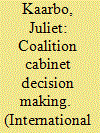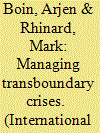| Srl | Item |
| 1 |
ID:
082054


|
|
|
|
|
| Publication |
2008.
|
| Summary/Abstract |
This essay reviews the intersection between institutional and psychological conditions that occurs in multiparty coalition cabinets and the effects on foreign policy and decision making. Parallel research in social psychology and foreign policy can provide clues to the underlying mechanisms linking institutional context to policymaking and policy choices. The psychological processes involved in group polarization, persuasion, and other influence strategies as well as psychological factors affecting the quality of decision making are important in coalition cabinets and are reinforced by the particular institutional dynamics of multiparty governance. Indeed, this essay proposes that future research focus on contingency factors in the policymaking process, given the competing views on the effects of multiple advocacy on the quality of decision making and on the types of foreign policies associated with multiparty cabinets. More broadly, this essay supports the view that a highly structural understanding of the effects of institutions on politics and policies is incomplete and that research on the interplay among structures and human agents is critical.
|
|
|
|
|
|
|
|
|
|
|
|
|
|
|
|
| 2 |
ID:
082052


|
|
|
|
|
| Publication |
2008.
|
| Summary/Abstract |
The nation-state faces an increasing number of what we refer to as "transboundary threats." A transboundary threat is characterized by the potential to cross geographical and functional boundaries. These characteristics outstrip the capacity of nation-states and national bureaucracies that were designed to deal with more classic threats. The institutional challenge, we argue, is to build effective transboundary systems for managing these complex threats. In this essay, we ask what role the European Union can play in such an endeavor. We document the EU's growing crisis management and security capacities and offer an initial assessment of these capacities. We surmise that the EU will play a significant but rather circumscribed role, one which reflects the EU's unique system of supranational governance
|
|
|
|
|
|
|
|
|
|
|
|
|
|
|
|
| 3 |
ID:
082053


|
|
|
|
|
| Publication |
2008.
|
| Summary/Abstract |
Does the war-making/state-making thesis, most associated with Charles Tilly, apply in the developing world If so, how? This essay reviews the bellicist literature and offers an explanation for variation in state capacity among the most war-prone states in the developing world. We investigate the influence of war on state strength in two countries, Afghanistan and Vietnam. We examine three hypothesized causal mechanisms about how war contributes to state formation: raising money, building armies, and making nations. We find that war in Vietnam contributed to state-building, while war in Afghanistan has been state-destroying. There appear to be two main factors that contributed to state-making in Vietnam that were absent in Afghanistan: the existence of a core ethnic group that had served as the basis for a relatively long-standing political community in the past, and the combination of war and revolution, which inspired state officials and facilitated the promulgation of a unifying national ideology. Of these two factors, comparative data suggest relative ethnic homogeneity is the most important. Absent these specific conditions, war is more likely to break than make states in the contemporary Third World.
|
|
|
|
|
|
|
|
|
|
|
|
|
|
|
|